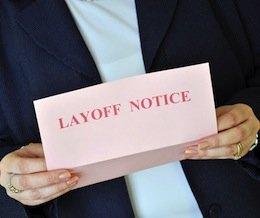of Employees
Mass Layoffs
Highly Experienced North Jersey Employment Attorneys Protecting the Rights of Laid Off Workers

Mass layoffs, downsizing, restructuring or something else —no matter what your employer chooses to call it, losing your job unexpectedly can be deeply unsettling. These decisions often come with little warning and can have significant emotional and financial consequences for you and your family. In a difficult economy, it is not uncommon for companies to eliminate jobs in an effort to cut costs, improve their balance sheets, or prepare for a merger, acquisition, or public offering.
However, even when job eliminations seem widespread or justified on the surface, the reasons behind individual decisions matter. If you suspect that you were selected for layoff based on bias, discrimination or retaliation, then your rights under New Jersey or federal employment laws may have been violated.
Layoffs Cannot Be Used to Hide Discrimination or Retaliation
In New Jersey, an employer generally has the right to eliminate positions for legitimate business reasons. But that right is not unlimited. What employers may not do is use a reduction in force (“RIF”) as a smokescreen to terminate employees for illegal reasons. Unfortunately, it is not unusual for companies to try to mask discriminatory or retaliatory motives behind the broader context of a layoff. They may hope that the larger workforce reduction will shield them from scrutiny and allow them to hide decisions to fire someone for an unlawful reason.
If your employer targeted you for termination based on your age, gender, race, disability, pregnancy, religion, national origin, sexual orientation, marital status, or another protected characteristic, then that decision was not only unfair, but it also was illegal. In New Jersey, the same applies if you were selected for layoff because you requested a reasonable accommodation, took protected family or medical leave, or reported unlawful conduct in the workplace.
You may not always have direct evidence that your employer acted unlawfully. But certain patterns—such as your replacement by a less qualified person outside of your protected class, the employer’s failure to follow its own layoff criteria, or a sudden recent change in how your performance was evaluated—can all support a legal claim.
What to Do if You Have Been Selected for Layoff
If you have recently been laid off as part of a reduction in force, or if your employer has notified you that your position is being eliminated, you should take time to evaluate whether you were selected for a lawful reason. You might want to begin by gathering documents such as performance reviews, internal communications, company layoff criteria, and the names and demographics of others affected. These types of details may help reveal whether your termination was truly based on neutral business reasons—or whether discrimination or retaliation played a role.
The Bergen County mass lay off attorneys at Rabner Baumgart Ben-Asher & Nirenberg, P.C. are highly experienced in employment law and can help you determine whether you may have a claim for wrongful termination, retaliation, or unlawful discrimination. We also can advise you on next steps, including deciding how to respond to a severance agreement and what to expect if you choose to pursue legal action.
Severance Negotiations and Review
Even when a layoff is lawful, you still may be entitled to a severance package. Some companies have severance policies in place, while others offer severance on a case-by-case basis. If you have received a severance agreement, then you should not feel pressured to sign it without a careful review. These agreements often contain terms that affect your future rights, including release of claims, non-compete clauses, confidentiality provisions, and non-disparagement language.
Our attorneys routinely assist clients in negotiating stronger severance terms, including additional compensation, extended benefits, and modifications to restrictive covenants. If we identify that your termination may have been unlawful, we also may be able to leverage that fact to improve the terms of your severance offer.
Your Rights Under the WARN Acts
Employees affected by large-scale layoffs may be protected under the Worker Adjustment and Retraining Notification (WARN) Act. The federal WARN Act requires employers with 100 or more full-time employees to provide at least 60 days’ advance notice of a mass layoff or plant closing.
The New Jersey WARN Act provides even greater protection. As of April 2023, employers in New Jersey with 100 or more employees must give at least 90 days’ notice and provide at least one week of severance pay per year of service to employees impacted by a covered mass layoff or business closure. These protections are mandatory and cannot be waived in advance.
If your employer failed to comply with these requirements, you may be entitled to compensation beyond your final paycheck.
Talk to a New Jersey Mass Layoff Attorney
If you have been laid off, it is important to understand that you have rights—and you do not have to go through this alone. The attorneys at Rabner Baumgart Ben-Asher & Nirenberg, P.C. are here to help you make sense of your rights and options. We will take the time to understand your situation, explain your legal rights, and work with you to pursue the best possible outcome—whether through negotiation, litigation, or both. Call us today at (201) 777-2250 or contact us online to schedule a confidential consultation.









